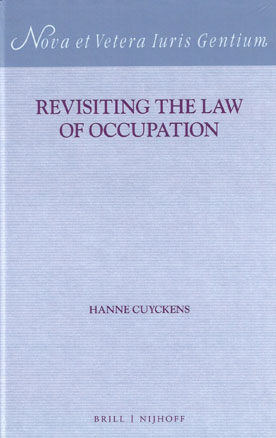
In Revisiting the Law of Occupation, Hanne Cuyckens assesses the crucial challenges faced by the law of occupation.
Through examples such as the occupation of the Palestinian Territories and the 2003 occupation of Iraq, the author convincingly demonstrates that although the law of occupation may no longer be perceived as adequate to address contemporary forms of occupation, a formal modification of the law is neither desirable nor feasible.
The author identifies means by which the potential dichotomy between the law and the facts can be addressed: 1) flexible interpretation of the law itself; 2) the role of International Human Rights law as gap-filler; and 3) the role of the UNSC as a modulator of the law.